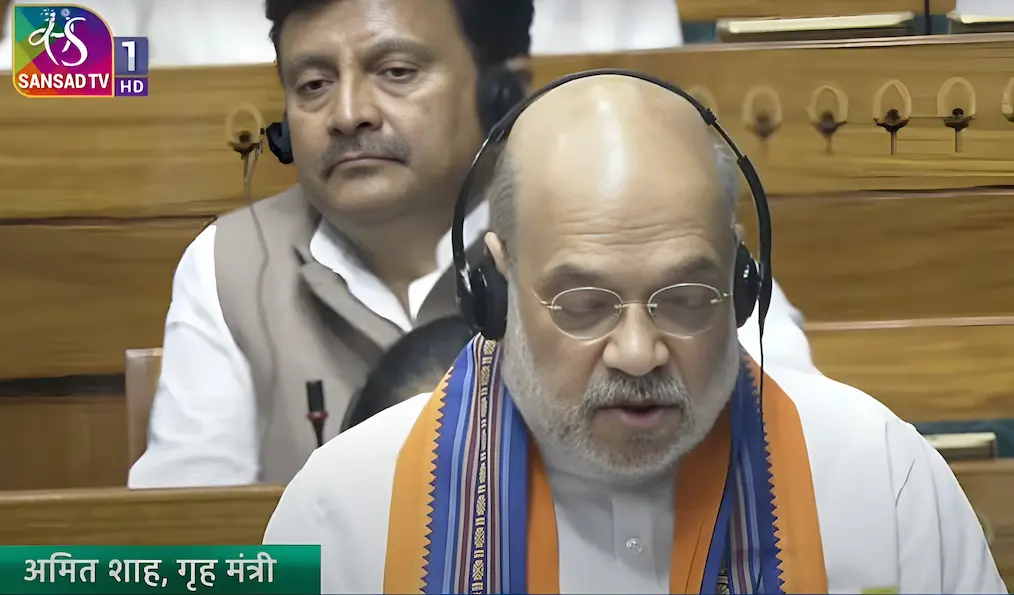
Home Minister Amit Shah announces landmark bills to bar jailed leaders from holding top government posts (videograb Sansad TV)
Amit Shah Bold Reform – In a decisive move to restore integrity in Indian politics, Union Home Minister Amit Shah today announced the introduction of three constitutional amendment bills aimed at preventing individuals lodged in jail from holding key constitutional positions such as Prime Minister, Chief Minister, or Union/State Minister. The announcement, made with the Lok Sabha Speaker’s permission, marks a watershed moment in India’s democratic evolution.
The bills, tabled during a special session of Parliament, reflect the Modi government’s commitment to elevating moral standards in public life and responding to growing public resentment over jailed leaders continuing to govern without accountability.
Amit Shah Bold reform: “Politics Must Be Rooted in Morality”
Addressing the House, Amit Shah declared:
“The Constitution’s framers could never have imagined a time when leaders would refuse to resign even after being arrested. This is not just a legal loophole, it’s a moral failure. Today, we correct that.”
Shah emphasized that the bills are not politically motivated but are rooted in the principle of clean governance. He cited recent instances where ministers and chief ministers continued to run governments from jail, calling it “a betrayal of public trust and democratic ethics.”
The Home Minister clarified that the amendments will not interfere with the legal rights of the accused but will set clear eligibility standards for holding office. “Public service is a privilege, not a shield against accountability,” he added.
Key Provisions of the Constitutional Amendments
The three bills introduced by Amit Shah propose the following regulations:
- Disqualification While Incarcerated: Any person arrested and lodged in jail will be barred from functioning as Prime Minister, Chief Minister, or Minister in the Union or State Government.
- Mandatory Bail Clause: If an accused leader fails to secure bail within 30 days of arrest, they will automatically cease to remain eligible to function in their constitutional role. The Prime Minister or Chief Minister will be required to remove them on the 31st day.
- Reinstatement Upon Bail: Once granted bail through due legal process, the individual may be reinstated to their position, ensuring fairness while upholding institutional integrity.
These provisions aim to strike a balance between legal due process and ethical governance, ensuring that the machinery of government is not compromised by criminal proceedings.
Public Reaction and Political Ripples
The announcement has sparked widespread debate across political and public spheres. Social media erupted with hashtags like #CleanPolitics and #JailReformBill, with many praising the move as long overdue. Citizens expressed support for the government’s stance, calling it a “moral reset” for Indian democracy.
However, opposition parties have raised concerns about potential misuse. Some leaders questioned whether the 30-day bail clause could be weaponized against political rivals. Shah responded firmly:
“This bill is not about targeting individuals. It’s about protecting the dignity of our institutions.”
Legal experts have largely welcomed the move, noting that it aligns with global democratic norms where ethical conduct is a prerequisite for public office. Political analysts suggest the bills could reshape electoral strategies, forcing parties to prioritize clean candidates and transparent leadership.
A Turning Point for Indian Democracy
Amit Shah’s announcement signals a shift in how India views political accountability. By codifying moral expectations into constitutional law, the government is attempting to redefine the standards of leadership.
The bills will now undergo parliamentary scrutiny, with debates expected in both Houses. If passed, they could become one of the most significant reforms in recent Indian political history, setting a precedent for future generations.
As Shah concluded his address, he posed a question to the nation:
“Is it right for a minister, chief minister, or prime minister to run a government from jail? The people must decide.”
Conclusion
With these constitutional amendments, Home Minister Amit Shah has thrown down the gauntlet, challenging India to choose between power and principle. As the bills move forward, the country watches closely, hopeful that this marks the beginning of a cleaner, more accountable era in Indian politics.
Also read – Jailhouse Governance Ends? New Bills Aim to Restore Integrity in Indian Politics
Stay updated with latest updated news blogs on Rapido Updates.
3 thoughts on “Amit Shah Bold Reform: New Bills to Bar Jailed Leaders from Holding Top Government Posts”
Comments are closed.